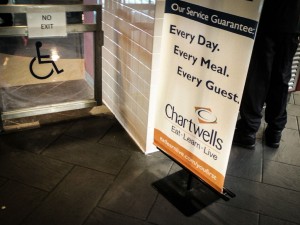The Corporation in the Cafeteria: A look inside the food service at Hudson Valley

Since June 1, 2004 Chartwells Dining Services has contracted with Hudson Valley’s Faculty Student Association (FSA). Chartwells is a subsidiary of the Compass Group, the largest dining organization in the world. Chartwells itself services more than 200 college campuses nationwide.
Chartwells operates in the Siek Campus Center, Williams Hall, the Science Center, the Dwight Marvin Library and in the concession stands at the McDonough Center, serving 600 to 1,000 people daily.
The FSA, a 501(3)(c) nonprofit organization that runs auxiliary services on campus and helps with construction projects for the college, formed a committee of students and administrators that chose Chartwells amongst competitors.
Chartwells currently gives the FSA a 10 percent commission on sales and has spent hundreds of thousands of dollars helping finance renovations on campus. At the start of the spring 2015 semester, that commission will be lowered to 6 percent after a contract renegotiation.
Last year the FSA earned $89,000 from the commission.
The value of lunch on campus
According to Ann Carrozza, executive director of the FSA, Chartwells has tried to ease the burden of expense since day one.
“When they came in, they developed a point of sales system and a debit meal plan, so students pay 8 percent less with their ID cards,” said Carrozza. “[In addition], for every $50 you put on [your account], you got an additional $5 off. That worked in the summer.”
304 students currently use the “swipe and save” meal plan.
“This is a number that should have a zero at the end of it. Those numbers are not good at all,” said Carrozza.
For some enrolled students, Chartwells’ strides are not enough to accommodate the budget of students.
“It’s expensive. The average college student’s budget is like five dollars a day,” said Ciara Martin, a liberal arts major.
Some students believe Hudson Valley’s meal plan deters students from making healthy choices.
“The selection is basic food. I have this every day I’m here for classes. I would want more but everything else challenges my price range. This is why people travel outside of campus,” said student Andrew Dugan.
“I don’t buy lunch here because it’s so expensive, but when I have bought it, I never really saw too many healthy options available,” said Joe Medina, fine arts major.
“They’re overly expensive so students start using the vending machine and have Poptarts and M&Ms for breakfast and dinner,” said student Abbie Marcelle.
Nutritional information is provided on http://www.dineoncampus.com/hvcc.
Contracting for food services
The FSA has previously run food services in-house, but they sought outside help to expand the program. It would have been difficult to create a meal plan system and meet rising demands without seeking a company to partner with.
“We were running it in-house when I came here [26 years ago],” said Ann Carozza. “If you were to ask me if I’d rather do it myself, part of me still says yes.”
“It’s the expertise the company brings. When running a single unit, you don’t have the purchasing power, human resources, infrastructure, technology available to support that,” said John Poole.
“There’s not many economies of scale when you do it yourself,” said Carozza, “Chartwells is nationwide. Chartwells has buying power that we do not have.”
A study by Roland Zullo, a professor at the University of Michigan, uncovered that cafeteria privatization had a link to lower test scores. He concluded that the poor nutritional product benefits of some companies have resulted in decreased academic accomplishment.
Peter Lasch, architecture major, said, “Let’s face it. Part of why students are not on the [meal] plan as expected is because they don’t trust a corporation like this with their lunch. It makes sense.”

Chartwells Policies
Danny Dawkins is the district manager of Chartwells. He started his 18 year career in the foodservice industry as a grill cook out of Charlton, North Carolina. His culinary background expands overseas with an apprenticeship in Germany, bringing Dawkins to the rank of executive chef.
Before his present 10 year run with Chartwells, Dawkins worked for corporate catering rivals Sodexo and Aramark.
Dawkins explained that Chartwells has a number of programs to pursue a policy of corporate responsibility.
“We partner with the Monterey Aquarium for sustainable seafood,” said Dawkins.
“We also partner with organizations for humane treatment of animals,” said Dawkins, “All of our eggs are cage free. Theres no genetically modified hormones in our milks. We have gluten free bread.”
Along with sustainable food sources and humane treatment of livestock, Chartwells attempts to minimize waste. “Trim Trax” is a program Chartwells has to reduce food waste. Over a period of time, excess bulk products are sent to community pantries.
“We monitor our food waste. By the end of Friday, we throw out 25 sandwiches, five or six packages or sushi and that is mostly the extent of it,” said John Poole, FSA food service director.
Employees of Chartwells belong to the Service Employees International Union and receive living wages and benefits.
Dawkins said, “The biggest difference between all the other food service providers and Chartwells is the entrepreneurial spirit.”
Food supply
The Sysco Corporation, Soko, Bella Napoli, Carioto Produce and Rockland Bakery distribute most of the food to the Chartwells at Hudson Valley.
Keira O’Connell, liberal arts major, said, “It’s school food. Questioning where its from makes it hard to digest on two levels.”
Chartwells is seeking to buy more local goods. About eight to ten percent of their supply currently comes from local food. “Our goal is to provide an outlet for local farmers. We want to give back,” said Dawkins.
“We’re working on trying to get with more local bakeries to provide our rolls and desserts,” said Poole.
Corporate Scandals
Although Chartwells has prioritized corporate responsibility, past incidents contradict that standard.
The Compass Group, parent company of Chartwells, is a multi-billion dollar corporation based in England. The company and it’s subsidiaries have had incidents that have occasionally compromised health.
The Compass Group was involved in a horse meat scandal in 2013, distributing the meat as products sold as beef. The United Kingdom’s Food Standards Agency published DNA testing results for more than 1,000 compass meat products, which turned out to contain traces of horse DNA.
After an FDA tortilla recall in 2006, Chartwells failed to notify officials of tortilla contamination resulting in over 100 children becoming ill in the Racine, Wis. school district.
In 2006, two UN representatives were convicted of taking nearly $1 million in bribes from the Compass Group. As a result of the scandal, Compass Group PLC CEO Michael Bailey stepped down.
In 2012, the Compass Group paid the New York State Government $18 million in a settlement after it was found they were overcharging school districts across the state. Among the 39 school districts that were overcharged include Glens Falls.
